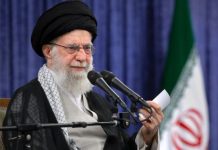By Aftab Alam
The Middle East is once again in the throes of a conflict with wide-reaching implications, one that threatens to pull in local, regional, and global powers. The ongoing war between Israel and Palestinian factions, notably Hamas, has already caused immense loss of life and destruction. But beyond the immediate humanitarian crisis, the broader goal seems to be a reshuffling of regional power dynamics, with various players—both inside and outside the Middle East—jockeying for position.
The scale of the war and its potential to draw in external powers like the United States, Iran, and others have created a situation that could redefine geopolitical boundaries in the region for decades to come.
What we are seeing is not merely a localized conflict between Israel and Palestinian groups. It is, in fact, a collision between local, regional, and global powers—each seeking to realign the geopolitical landscape to fit their interests. The United States, Israel, pro-Western Arab nations, and Iran are all pursuing objectives in this chaotic environment.
Israel, in particular, is waging an all-out war not just against Hamas but also against Iranian-backed groups like Hezbollah, with the ultimate aim of weakening Iran’s influence in the region. This has unfolded with the tacit approval of major global powers, especially the U.S. and pro-Western Arab states, which are looking to secure their interests in the future political configuration of the Middle East.
This current geopolitical situation draws parallels to the 19th-century Scramble for Africa, where great powers divided the continent into spheres of influence for their own strategic and economic gains. Today, the Middle East appears to be a settled sphere of influence for the United States, while other global powers like China and Russia are focused on different regions. China, for example, seems more interested in expanding its influence in South and Southeast Asia, Africa, and parts of Latin America, while Russia is absorbed in maintaining influence over the Baltics, Central Asia, and Orthodox Eastern Europe.
Both China and Russia have limited involvement in the current Middle Eastern conflict because they are preoccupied with their own pressing issues. China’s primary focus is on sustaining economic growth, while Russia is heavily invested in its military campaign in Ukraine. At this point, both powers have their hands full and would find it challenging to pursue more aggressive policies toward the Middle East, where the U.S. remains the dominant external actor.
The Hamas attack on Israel on October 7 has raised significant questions about whether Israel may have seen this as an opportunity to escalate the conflict. Some observers speculate that Israel might have taken a “looking the other way” approach on that day, allowing the assault to unfold to create a pretext for launching a broader military campaign. This would give Israel the justification it needed to not only target Hamas but also strike Iranian proxies and potentially Iran itself.
This theory holds that Israel’s response was not merely reactive but a calculated step in its long-term strategy to reshape the region’s power dynamics, and to do so with international support. Israel’s current military campaign seems to follow the principles of Otto von Bismarck, the 19th-century Prussian chancellor who achieved his objectives through calculated wars. By launching intense military operations, Israel is attempting to achieve its strategic interests by force rather than through diplomatic negotiations.
For decades, the status quo in the Middle East has been characterized by a delicate balance of power, with repeated cycles of conflict and ceasefires between Israel, Palestinian groups, and neighboring Arab nations. However, Israel’s recent actions suggest it is seeking to disrupt this balance by weakening its adversaries, particularly Hamas and Hezbollah, and forcing a new regional order where it holds a position of strength.
Pro-Western Arab states like Saudi Arabia, Jordan, Egypt, and the UAE have been noticeably restrained in their public statements. While they offer lip service in support of the Palestinian cause, they seem to have given Israel a tacit green light to pursue its military objectives. These nations stand to gain from a realignment in the Middle East that weakens Iran’s influence and provides them with greater leverage in future regional negotiations.
When the time comes to sit at the negotiating table, these countries will likely be key players, working to shape the new regional order—even if it comes at the expense of the Palestinians and other Arabs. Israel’s military actions are clearly aimed at securing a position of strength in any future negotiations. By inflicting severe damage on Gaza and Palestinian resistance forces, Israel is hoping to force Hamas and other groups into negotiations from a position of weakness. The humanitarian toll, while tragic, is seen by Israel as necessary collateral damage in the pursuit of long-term security and dominance.
This strategy also extends to Hezbollah, which Israel has directly involved in the conflict. By striking Hezbollah’s positions and weakening its capabilities, Israel is hoping to limit Iran’s influence in Lebanon and reduce the threat on its northern border.
Ironically, Hamas, which has become one of Israel’s most formidable enemies, was originally seen by some Israeli officials as a useful counterbalance to the secular Palestinian Liberation Organization (PLO). In its early years, Hamas was indirectly supported by Israeli authorities in the hope that it would divide Palestinian political unity and weaken the PLO. However, this strategy has backfired, as Hamas has evolved into a powerful force that now plays a central role in the current conflict.
Iran has long backed groups like Hezbollah and Hamas as part of its broader strategy to project influence in the region. However, with the current conflict targeting its proxies, Iran may find itself at a disadvantage. Should Israel succeed in significantly weakening these groups, Iran may be forced to compromise.
At the negotiating table, Iran may end up sacrificing its influence over Hezbollah and Hamas in exchange for ending sanctions and gaining broader acceptance in the international community, especially among Western nations. The outcome could be a diminished role for Iran in the region, even if it manages to secure some concessions from the West.
At this moment in history, both China and Russia have limited strategic interests in the Middle East. China, as mentioned earlier, is focused on expanding its economic influence in other regions, particularly in Asia and Africa. Russia, on the other hand, is heavily preoccupied with its military campaign in Ukraine and maintaining influence over its traditional spheres in Eastern Europe and Central Asia.
Their lack of direct involvement in the current Middle Eastern conflict allows Israel and its Western allies to pursue their objectives with minimal interference. Without the looming presence of China or Russia, the U.S. remains the dominant power shaping the future of the Middle East.
Israeli Prime Minister Benjamin Netanyahu’s domestic political troubles also play a significant role in the current crisis. Facing corruption charges and political instability at home, Netanyahu has seized upon the conflict as a way to solidify his leadership and distract from internal issues. By projecting military strength and rallying nationalistic sentiment, Netanyahu aims to shore up his political base and present himself as the protector of Israel in a time of crisis.
The ongoing Middle East crisis is a complex power struggle involving multiple regional and global actors. Israel, with the backing of the U.S. and the tacit approval of pro-Western Arab states, is seeking to reshape the region’s geopolitical landscape, particularly by weakening Iranian influence. However, the cost of this realignment will be borne primarily by the Palestinian people, who continue to suffer immense casualties and displacement.
Meanwhile, China and Russia, preoccupied with their own priorities, are unlikely to become directly involved in the conflict. This absence leaves the U.S. and its regional allies in a dominant position to influence the future of the Middle East. As the conflict drags on, the risk of a broader regional war looms large, and the question remains whether any of the involved parties can achieve their strategic goals without further plunging the region into chaos.
For now, the people of the Middle East—especially Palestinians—remain at the mercy of larger geopolitical forces that are reshaping their world.
(The writer is a civil servant with experience in various sectors, including development. He can be contacted at [email protected])

















